#nihongo no mori
Text
one thing i learn from learning japanese is textbook is good for the basisc in structuring and grammar. but sadly that is it for me personally. what helps a lot more in my opinion is connecting the textbook style grammar, kanji, kana and JLPT study on the SIDE of what you love doing. doing what you love in japanese helps profoundly as textbooks are very limited in how they teach, and most aim for JLPT proficiency for the japanese language exams rather than for enjoying living, reading and speaking freely within Japanese society
#personal#there are some non textbook style japanese learning youtube channels like nihongo no mori#but yeah id warn severely against using textbook as main methedology because as a person who did that in my degree#it really made it hard#japanese#japanese studies
0 notes
Text
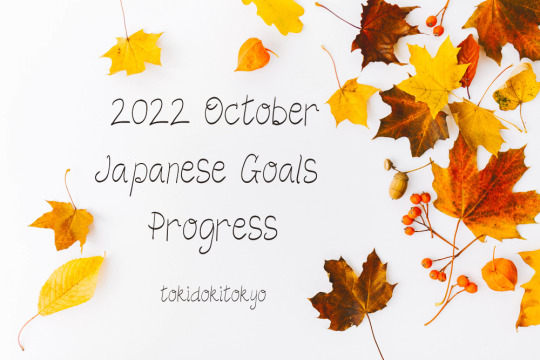
2022年10月31日
Fall is in the air and it's a cozy time to study Japanese. It's also a time of the year that marks the busy season for students and employees alike. This fall I have been focusing on reading, trying to read anything and everything, and focusing on retaining things like vocabulary and kanji from these readings.
秋されの折、皆様にはますますご健勝のことと存じます。家で日本語の勉強することがぴったり季節ですよ。そして、学生も社会人もますます忙しくなる時期ですね。今年の秋の目的は日本語でいつでも何でもことに集中しています。読んだ単語や漢字も覚えられます様に努力をしています。
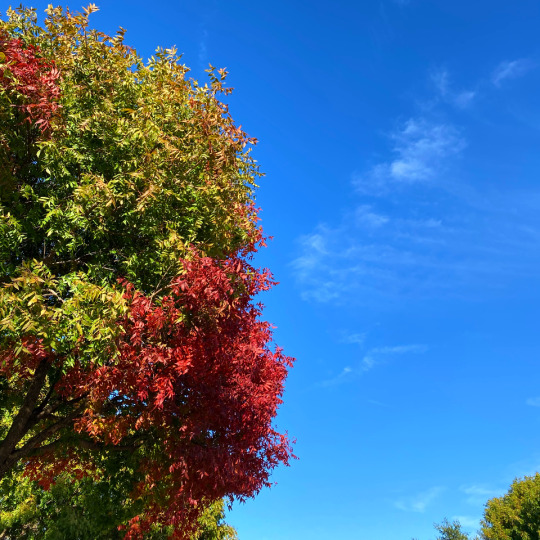
What I've Been Reading This Month
夜カフェ (Yoru Cafe) - A chapter book aimed at children, with the characters being around middle school age. Cute and heartwarming, but with a very slow pace, this is the first book in a series.
月刊少女野崎くん (Monthly Girls' Nozaki-kun) - A manga about a male high school student who illustrates girls' manga, his female classmate and fan, and all the other characters around him that he inserts into his work.
おじさまと猫 (A Man and His Cat) - A manga about an older man and the cat he adopts. Funny but with plenty of tear-jerking moments, this is a fast and adorable read.
NHK News Web Easy - Quick, easy-to-read articles designed for language learners and school kids to read. You can turn on/off ふりがな and the articles include up-to-date news information.
NHKニュース - The regular NHK news site, for when I have some more time, to read more in-depth articles for a Japanese audience.
絵本 (picture books) - Reading picture books with my son is a great way to practice 1) reading walls of hiragana, 2) reading aloud, 3) daily words with my son.
にほんごたどく (Tadoku Graded Readers) - A treasure trove of free graded readers for beginners and those who want to practice reading in Japanese. (Might I particularly recommend デカりんご).
Other Study Tools I Used This Month
renshuu.org - Kanji & vocabulary quizzes
Jisho.org - English/Japanese Dictionary (one of the most used dictionaries)
weblio - Japanese-Japanese Dictionary
言葉で遊ぼう (Kotoba de Asobo) - Japanese Wordle
Japanese podcasts
Things to Try Next Month
I spent October working on reading, and trying to focus on attaining new vocabulary and kanji knowledge at the same time. So in November, I'd like to focus on a different aspect of Japanese learning. I would like to get back into grammar, reviewing and learning new grammar points.
Handbook of Japanese Grammar - A grammar learning resource, separated by each grammar point.
日本語の森 (Nihongo no Mori) - Grammar videos separated by level, short and sweet for review or learning new grammar.
As the year comes to an end I will be looking back at how I started this monthly diary of my Japanese studies, and where I am now. I would like to review my goals and renew them. Have some of them changed? Definitely! Have some of them remained unfulfilled? Most certainly. But that is a natural part of the language learning process, and the changes in my goals reflect the changes in my priorities and the evolution of my knowledge of the language. So look forward to that in the next update!
Thanks as always for reading!
年末がどんどん近づいてて、今年の最初の目的と今までの進歩を分析したり、比べたりしてまとめて書こうと思っています。来年の目的も考えておいて、日本語の能力の成長について書き留めておこうと思っています。今までの目的が変わったり、満たされてなかったりしても、それは言語の勉強の一方だし、それからも成長ができて、自分の目指してる夢も叶えられますし。だから、来月も楽しみにしてね!
いつもありがとうございます!
#日本語#japanese#japanese langblr#japanese language#langblr#studyblr#日本語の日記#japanese diary#japanese goals#japanese goals october 2022#japanese goals 2022#tokidokitokyo#japanese studyspo#tdtphoto#my photo
56 notes
·
View notes
Photo

Nature in Japanese is 自然(shizen). Forest in Japanese is 森 (Mori)🌳 Mountain in Japanese is 山(Yama) ⛰ Sea in Japanese is 海(Umi)🏖 River in Japanese is 川(Kawa)🐟 Learn more vocabulary at my blog: https://www.punipunijapan.com/ Do you have any Japanese questions? Do you want you to be able to speak Japanese? It is the perfect time to start learning Japanese🇯🇵 Take Japanese lessons online with our professional Japanese teachers \(◕ω◕)/☆ We can teach you Japanese step by step and make the customized lesson for you. You can take a FREE trial lesson here now🌸👉 http://kakehashijapan.com #learnjapaneselanguage #studyingjapanese #Japanesevocabulary #nihongo #learnjapanese #studyjapanese #Japanese #Japan #kanjistudy #learningjapanese #japanesewords #Japaneselearner #japanese #Japan #japaneselanguage #japaneselessons #japaneselesson #learnjapanese #japaneseteacher #Japaneseculture #japaneseclass #kanji #JLPT #japaneselanguage #learningjapanese #日本語 #日語 #日本語勉強 #🇯🇵 #jlptn5 #jlptn4 #jlpn3 #jlptn2 #日本語能力試験 https://www.instagram.com/p/CjhHAN1JQfR/?igshid=NGJjMDIxMWI=
#learnjapaneselanguage#studyingjapanese#japanesevocabulary#nihongo#learnjapanese#studyjapanese#japanese#japan#kanjistudy#learningjapanese#japanesewords#japaneselearner#japaneselanguage#japaneselessons#japaneselesson#japaneseteacher#japaneseculture#japaneseclass#kanji#jlpt#日本語#日語#日本語勉強#🇯🇵#jlptn5#jlptn4#jlpn3#jlptn2#日本語能力試験
22 notes
·
View notes
Text
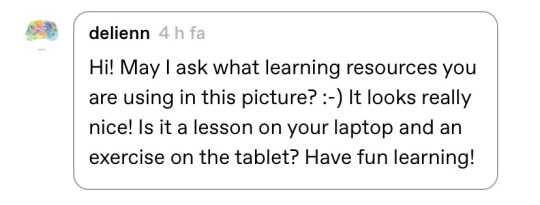
🚨 MY ASK BOX IS ALWAYS OPEN SO USE THAT PLEASE 🚨
>> reference: my latest study log
they’re actually both from a website called 日本語の森 (Nihongo no Mori), I just recently purchased a yearly subscription as I really really like their approach to teaching Japanese
website link:
if you want to get an idea of what they do, you can check out their YouTube channel, but consider that it’s like a bland overview of what you can get on their website!
hope I cleared all of your doubts and curiosities
#studyblr#langblr#languages#japanese#japanese language#japanese langblr#japanese studyblr#japanese resources#language learning
13 notes
·
View notes
Note
oh ho ho
why hello there
I just read through a bunch of the stuff you have about yourself, and now you have to deal with me <3
so first of all: i saw that you really liked blue period, and I was wondering how you'd recommend it? I keep on wanting to watch it but my mind goes "but you have this thing" and "what about the other three animes you're watching" but who cares! It looks really pretty tho. Also me and my partner are going to watch Bungo Stray Dogs together (eventually-) bc it's his favorite anime lol.
ok next point: WATERMELON IS ONE OF MY FAVORITE FOODS I LOVE WATERMELON. MINT CHOCOLATE CHIP ICE CREAM IS THE BEST. and i agree, winter and autumn are the best seasons. rain. rain is nice :).
third and i think final thing: you're learning japanese, you say? ok, i have a few questions for you. what are you learning it on? (i'm learning it on the demon bird app, aka duolingo). what words have you learned? what do you know about the grammar/word structure? and the scary one: have you started learning the terror that is katakana? (if no, it's just another alphabet with the same order and sounds, except different characters. i hate katakana :,>) because i can't type in japanese on my chromebook, i'll just use the romanji. But expect me to send you random hiragana and have you say what it is!
Kimu-san, yahho! Anata ga kakkoii to karai desu yo! (i promise you it's a compliment <3)
try to tell me what that means, and expect more random japanese in your future :)
anyways have a lovely day byeee <3
when i saw the 'oh ho ho' i heard french venti LMAOOO 💀💀
omg new moot guys NEW MOOT !! u match my vibe so <3
BLUE PERIOD IS SO SHHEHEHEHHE esp if ur an artist like myself, it gives u a different and probably more professional view of art ^^ For wat i like abt it, i'd say da characters and how theyre written. The main character is pretty relatable. Theres another character who has family issues and may be trans (or genderfluid? it isnt confirmed but she was born male, currently dresses feminine and hates it when people uses her dead name). Another one who was born a 'Genius' but doesnt really understand art, hes only doing it bcs its basically wat he can only do. Another character who'm gets compared to her older sister and so on. Even minor characters have well written stories
I suggest u watch da anime THEN read da manga from da beginning :>>
Sanaol may partner- jkjk ur prob fil but imagien having a partner 😭 my lonely ass could never
U SHOULDD WATCH BSD!! I LOVEEE DA ENDINGS ITS SUCH A VIBE AND DA OPS R BANGERS UGH THE CHARACTER DESIGNS AND PLOT I WANNA 👊 ITS INTERESTING BUT I SUGGEST ALSO READING THE MANGA FROM THE BEGINNING SINCE THE ANIME SKIPS ALOT OF THINGS AND IT MIGHT GET U CONFUSED 😭😭
Also, hes so true for that, hes DEF a keeper 💪 unless hes a mori/fukuchi stan then ew no
YESSS WATERMELON AND MINT CHOCO CHIP ICECREAM LOVERSS <333
Honestly, cold weathers >>>>>>
Im currently just memorizing da basics; hiragana and katakana before i continue off where i left off in grammar and vocab (i'll most likely start over since its been arounf half a year and i have goldfish memory 🥲) Ive already memorized hiragana, now im going with katakana but im focusing on art lately since i just got my stylus back so im prob not gonna do it for awhile but i'll try to before may >:DD
I currently only use 'Write it Japanese!' app on mobile, its REALLY useful, idk anything to help with grammar but my jp speaking friend recommends da book 'Minna no nihongo'. She used to be my jp study buddy but shes been VERY busy with uni lately so :'''D
AND YES BBG (can i call u dat??) LETS PRACTICE TOGETHER <33 tbh it would be better if we use hiragana/katakana/kanji (i literally dont know kanji SOBS) since it helps us learn!! AND DAT WOULD BE FUNN
From just my understanding: 'Kim-san, Yahoo/hello! Youre a cool person [smth smth]'
from google: 'Kimu, Yahoo! It hurts to think you're cool' (pls get ur shit together google 😭😭i couldnt call my friends bitches lovingly bcs of u)
YES I'LL BE EXPECTING THEM <33 I HOPE U HAVE A LOVELY DAY TOO HON
LMAO WAT DO I CALL U?? I WANNA ADD UR MOOT TAG
2 notes
·
View notes
Text
November JLPT Cramming Month
In the spirit of both NaNoWriMo and studying for the JLPT N2 exam that I am woefully unprepared to take, I will be dedicating the month of November to microblogging every day about a Japanese grammar point and vocab word.
I will be relying heavily on the Nihongo no Mori (日本語の森) Youtube videos on grammar and vocabulary. Every day, I plan to watch - or re-watch - one video from each playlist and blog about (1) a grammar point of the day and (2) a vocabulary word of the day.
I plan to shamelessly take example sentences from other parts of the internet in these posts, and the idea is that at the end of 30 days, I should have a small collection of N2 words and grammar points that I know well.
Word of the Day #1 - 適当
適当 (tekitou) means "suitable" or "appropriate", as in 「適当なときに彼にそれを言いましょう。」 - "Let's tell him at the appropriate time". It's generally used to refer to situations
Grammar Point of the Day #1 - 「 V+以上 」
「 V+以上 」 means "because" or "now that". Given that Japanese has seemingly countless words that mean "because" - from から to ため to ので - it's probably easier to just remember V+以上 to mean "now that". In this sense, it's very similar to からには.
For example, 「映画館に来た以上、ポップコーンを食べよう」 - "Since we're at the movie theater, let's eat popcorn." The implication is that being at the theater is a notable occurrence, so we should the 適当なこと, which is eating popcorn.
It should be noted that attaching 以上 at the end of a verb / sentence is different than the similar point 以上に, which means "more than". For example, 「...思った以上に高い...」 means "more expensive than I thought".
4 notes
·
View notes
Note
Um, hello!
I see you took the JLPT. I'm gonna be shooting for it myself one of these days. If I may ask, what resources did you use for learning? Classes, immersion, or otherwise.
Hello!! :)
I have been teaching myself and mostly focusing on what I wanted to know until a couple of months ago when I focused purely om revising for the exam. So my knowledge is all over the place lmao but for the JLPT I used a mix of resources.
Websites: I used Maggie Sensei and JLPT Sensei a lot and Nihongo no Mori! They mostly have materials for N1 and N2, but there are some good N3 videos as well! (YouTube).
Apps: In the month leading up to the exam I used the Migi JLPT app, you can do a few mock tests and various exercises for free with it, or pay for full access to all materials.
For Kanji, I just got several anki decks and went through them over and over but I know some people do not like the repetitive flashcard method! Some of my friends use and recommend WaniKani!!
Textbooks: I used the Kanzen Master series, and really recommend this series! :)
Also if you ever want any links or to chat about studying or anything drop me a DM! :D I'm happy to complain about talk about the JLPT.
2 notes
·
View notes
Text
Nihongo no midare ka henka ka
New item:
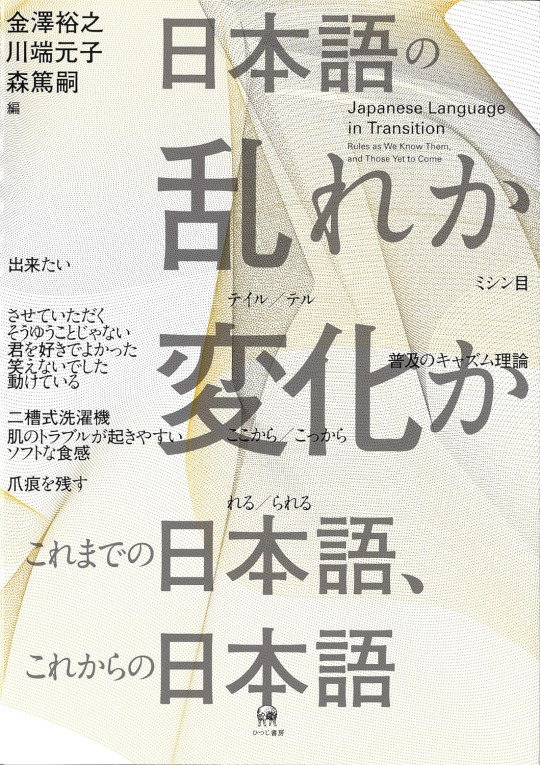
"Deviation from the rules is generally perceived negatively. However, from the actual flow of history and culture, it is often the driving force behind the creation of new eras and trends. This book takes up various aspects of past and ongoing changes in the Japanese-language, and attempts to reconsider such things as 'disorder', 'correctness' and 'change' in the language from a dynamic perspective.
Shelf: 810.26 NIH
Nihongo no midare ka henka ka : kore made no Nihongo, kore kara no Nihongo = Japanese language in transition : rules as we know them, and those yet to come.
edited by Kanazawa Hiroyuki, Kawabata Motoko, Mori Atsushi.
Tōkyō : Hitsuji Shobō, 2021.
ISBN: 9784823410376
259 pages : charts ; 18 cm.
Includes bibliographical references at the end of each chapter.
Text in Japanese.
Table of contents:
"Wakamono no kotoba kara mita Nihongo no mirai / Kanazawa Hiroyuki.
Juju hyōgen no bunpōteki itsudatsu hyōen / Yamada Toshihiro.
Onsei ni okeru itsudatsu / Ozaki Yoshimitsu.
Jpoppu no kashi ni mirareru itsudatsu hyōgen / Noda Harumi.
Daigakusei no bunshō ni mirareru itsudatsu hyōgen / Kawabata Motoko.
Shōhinmei ni miru arata na hyōgen no sanshutsu to teichaku / Minokawa Eriko.
Shingo no teichaku to sono jōken / Hashimoto Yukihiro.
Gairaigo no hanran ran'yō to jojutsugoka / Kimu Eran.
"Tsumeato o nokosu" no "shin'yōhō" kara kangaeru kan'yōteki na hyōgen no itsudatsu / Okada Shōhei.
Kaki kotoba ni okeru teru shukuyakukei to Nihongo kyōiku / Mori Atsushi.
Wakamono no kotoba kara mita Nihongo no mirai / Kanazawa Hiroyuki.
Kokkai shūdango no tanjō hattatsu katei ni miru itsudatsu genshō / Matsuda Kenjirō.
Gengo henka to shakai kankyō / Yokoyama shōichi.
1 note
·
View note
Text
ramblings on the JLPT and whether I want to put myself through that hell again
I’ve been thinking recently about pursuing the JLPT N1.
For those that don’t study Japanese, the JLPT stands for Japanese Language Proficiency Test, and it’s a standardized test that is widely accepted as an indicator for Japanese level. The test consists of five levels from N5 to N1, N5 being very basic Japanese and N1 being native-level fluency. I passed the N5 in high school which isn’t really anything to write home about, but passed the N2 in my senior year of college. Employers looking for Japanese proficiency will usually ask for N2 or N1 on your resume. N2 is a high level of fluency, but not fully fluent.
The higher levels of the JLPT consist of three parts generally: (1) vocabulary, kanji, and grammar, (2) listening comprehension, and (3) reading comprehension. You need to score just under half of the points available in each section and a total of a 50% score overall (55% for N1). Unfortunately the test does not measure speaking or writing ability, which can be misleading about overall ability, especially on a resume. I am definitely lacking when it comes to my speaking ability from lack of practice and from being overall shy and embarrassed to make mistakes. Therefore my passing of N2 looks great on a resume for me, but in actuality my speaking ability does not reflect high fluency at all.
I decided after passing the N2 that I would never try for N1 because with my career path I just don’t need it. There’s no reason to put any effort or money (signing up for the test is about $60 plus the cost of study materials) for something that is not necessary for me. I stand by this logic still, but the thing that has me considering it now is solely based on how bored I am at work and how much I love a mindless task.
I have 10-15 hours of deskwarming time each week at work between classes. I’ve been using that time to make class activities, scroll around on the internet, check emails, and make blog posts, but am finding I’m just bored and sleepy a lot of the time. So I’ve been thinking about ways to use that time more productively. I considered taking online courses in specific skills to help my career when I return home, but many of them cost money which I don’t feel financially capable of yet. So instead I decided to buy an N1 textbook and begin studying in my free time.
The textbook is made by Nihongo no Mori and I’ve found it quite useful so far. I definitely recommend it to anyone studying for the N1 or N2. It contains sections teaching vocabulary, grammar, and tips for the reading section. There’s about 4000 vocabulary words over 70 some pages, so I’ve been taking my time just making flashcards of the vocabulary one page at a time. It has helped tremendously to give me something productive to do at work and also makes me look more diligent to my coworkers since it’s keeping me off my phone at my desk. It’s also nice to study vocabulary and slowly notice the words being used around me and getting real life examples. Some of my coworkers even help to explain some of the hard words to me. I’m very grateful to be in an immersive environment where I can practice what I learn in real time.
Passing the N1 is not an easy task. It contains incredibly difficult language even for native Japanese people. Therefore I’m going to take the studying slowly and don’t expect to pass the test within the next year, or even to pass it at all. Either way, I’m satisfied to have something to do with my time that is helpful to my daily life and makes my desk hours go by more quickly.
Anyway, thanks for reading my boring ramblings. This post is another perfect example of me just trying to waste time at work. If you have any other suggestions of productive (and appropriate, so no Netflix sadly) ways to spend my desk time, let me know! Anyway, guess I’ll get back to studying for now.
0 notes
Link
So, I think everyone knows this YouTube channel, or at least I hope so. I think the lower levels are by a guy. But, this series here is about a year old. She has broken down N2 grammar into 36 lessons. Meaning, you can basically learn the grammar in depth in just a little over a month. It’s nice because she compares similar grammar points and explains the difference.
One of my goals this year is to do an online lesson a week. I always meant to since I was around the N3 level, but just kept putting it off. It’s supposed to be weekly, but I watched another today (#2 of this series) and I feel like I could watch one each day instead. They aren’t too long either. She has a Kanji series too I’m excited to look at.
Please give it a try! =)
286 notes
·
View notes
Note
hey, could you please share your Japanese learning resources with us?
of course, i'd be happy to!
here is a megafolder with pdfs of a bunch of different language textbooks. for Japanese, a lot of people recommend starting with Genki. Tobira is also a good one, and there are PDFs out there if you search for them.
Tae Kim's Guide to Japanese is also a really good completely free resource.
i personally started learning using Duolingo, which I think is a good if you're starting from zero because it'll force you to read in hiragana and you'll get a good feel for how Japanese sentences are constructed and a lot of different vocabulary. plus it's free.
I'm also using Wanikani, which is for memorizing radicals, kanji readings, and vocab. it uses mnemonic tricks to help you memorize and I've found it extremely helpful so far, but only the first three levels are free.
Satori Reader is one I've just started using and I also love it so far. It's like episodic stories that you can read and listen to, with notations for each word or grammar point in case you don't know it. the stories are really well-written and interesting so it makes reading practice fun. unfortunately it's also not free.
on youtube I listen to Japanese Ammo with Misa. she has some really good grammar explanations and lower level listening practice, as well as a lot of videos about vocab related to specific situations and topics, which are pretty interesting. I've also seen Nihongo no Mori recommended but i haven't gotten around to watching it yet.
JLPT Sensei is a good website to use as a reference especially for grammar points.
that's all i can think of for now. hopefully you'll find these useful!
8 notes
·
View notes
Text
My Favorite Youtube Channels for Learning Japanese:
Jp Launch - This guy mostly teaches vocabulary, kanji and counting information, but his channel isn’t exclusive to only N5 learners. In fact, he posted N3 content just recently.
JapanesePod101 - Has a LOT of videos and is a very well rounded and credible channel. Teaches everything, sometimes TOO thorough (knowledge overload).
Yuko Sensei - I love how she breaks grammar points down and explains it so simply and to the point. Great for anyone who is serious about learning Japanese, especially beginners. (Or if you just need to brush up on something!)
Japanese Ammo with Misa - Casually but thoroughly explains study tips, grammar points, etc. Minimal visual aid.
Japanese From Zero - This isn’t the most simple and to-the-point channel, but it is a credible one. It’s another channel that doesn’t offer much visual aid.
Conversation Exposure:
That Japanese Man Yuta - Interviewer
Find Your Love in Japan - Interviewer
Advanced:
Bilingirl Chika - Teaches Japanese speakers how to speak English.
Nihongo no mori - FOR EXTREMELY ADVANCED LEARNERS. Teaches in Japanese without subtitles. Helps prepare for N1, N2, N3 JLPT exams.
#how to learn japanese#japanese#japanese beginner#hiragana#learn japanese#learning japanese#learning japanese blog#studyblr#japanese student#japanese studyblr#japanese blog#how to learn a language#learning language#にんじん#日本語#にゃんすたぐらむ#にゃんにゃんにゃんの日#にゃんこ部#youtube#how to become fluent#japanese langblr#highly recommend
234 notes
·
View notes
Text
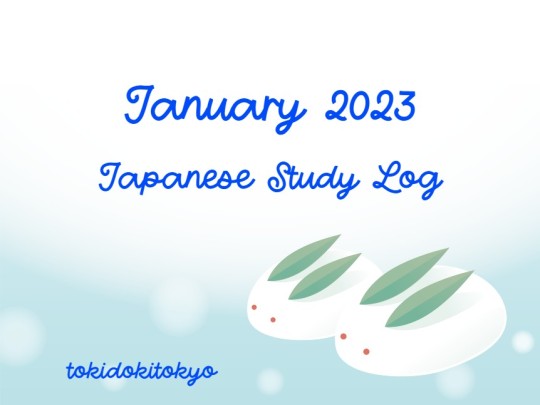
2023年1月31日
Welcome to my first study log update of the year! The year is still fresh and I'm happy to report that my motivation is still high. I find that making these study logs to track my progress I can maintain my motivation throughout the year, even during times where life and work get really busy and I think I won't have as much time for study. So, let's start this off!
今年の初勉強記録へようこそ!新年はまだ新鮮のに勉強のモチベーションはまだ高くて頑張っています。この勉強記録を作るのは勉強のモチベーションの一つになります。一年中に書くと、モチベーションが下がったり、忙しくな���たりするときでもやる気が出ます。それで、今から1月の記録を始めます!
My 2023 Goals Progress
I laid out some broad goals for my Japanese study in my 2023 Japanese Language Goals post. This is my first report on the progress I've made on these goals during the month of January!
1. Read one page a day of 日本の歴史366 (にほんのれきし366) everyday in 2023.
Since it's only a page to read, and the subject is history, I make time to read the page (and look up the vocabulary I don't know ^^) every day.
2. Finish 日本語総まとめ N3 (にほんごそうまとめ N3) workbooks.
The JLPT N3 workbooks I am using are a bit more involved, so I can't do the work daily, but when I do have the time (about once a week or so) I sit down and go through the Vocabulary, Kanji, Grammar, and Listening workbooks all at once.
3. Review and learn the first 6 levels of the 常用漢字 (じょうようかんじ), specifically the 教育漢字 (きょういくかんじ) up to grade 6.
Lately, I have been focusing more on new kanji rather than kanji review of the 常用漢字, but in February I will return my focus to the grade 2 kanji I was reviewing previously.
4. Read at least one book every two months.
I think I might have taken on too much in January, as I have been trying to finish up a book I started in December, then I picked up a new book and a new manga in the beginning of this year. I am going through the new book page-by-page and recording any words or I don't know, which is taking up a lot of time. I doubt I will finish it this month, but once I am done with it I think I will have learned a lot of new vocabulary.
5. Improve my speaking and writing by finding a tutor.
I have put this goal on hold because of work, but when things calm down in April I plan to search for a tutor and make a weekly tutoring schedule. I plan to use italki because it is the most popular platform.
6. Study Japanese for at least 10 minutes a day.
This goal has been a habit of mine since the beginning of 2022, and I am glad to see that I have been keeping up with it so far in 2023. I have a basic tracker set up in Notion, and this inspires me to do something every day so that I have something to record. I've also picked up a heat map tracker from No zero days in 2023 langblr challenge which provides another visual method for tracking my daily study.
These methods help me to be very mindful with my studying, which is what 2023 is all about for me!
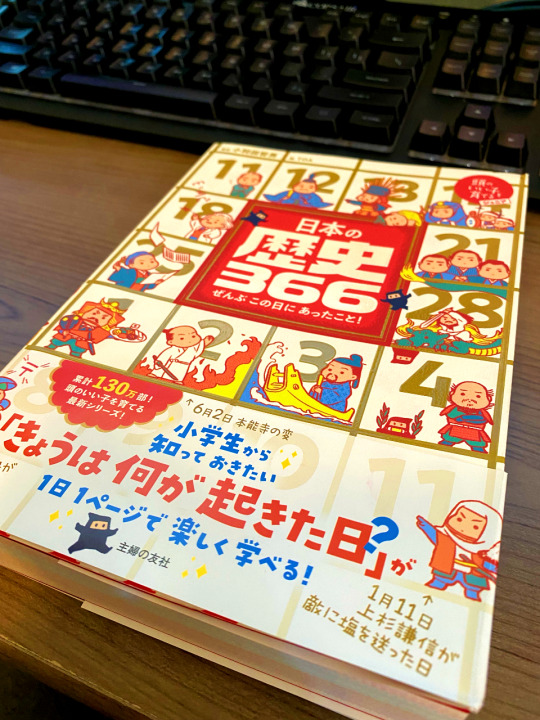
January Study Log
Reading - I have started off strong with reading, although I've probably taken on more reading material than I have time for. Books I am currently reading:
コンビニ人間 - finishing from December (22% done)
満月珈琲店の星詠み - started Jan. 1st (15% done)
花野井くんと恋の病 (manga) - started Jan. 1st (30% done)
Vocabulary & Kanji - A lot of my vocab & kanji comes from my reading and making a vocab/kanji list from the 満月珈琲店 book I'm reading, but I also try to do vocabulary & kanji flash cards on a daily basis.
Vocabulary & Kanji flash cards (renshuu.org)
言葉で遊ぼう (Japanese wordle)
Listening - Primarily conversational listening with family and friends, or TV/movies, but with some 総まとめ workbook listening sprinkled in. I'd like to do some focused JLPT listening practice soon!
Grammar - Grammar videos are one of the best ways for me to study since they are about 15 minutes each and I take hand-written notes. This month I finished up the Nihongo no Mori JLPT N3 grammar videos!
日本語の森 N3
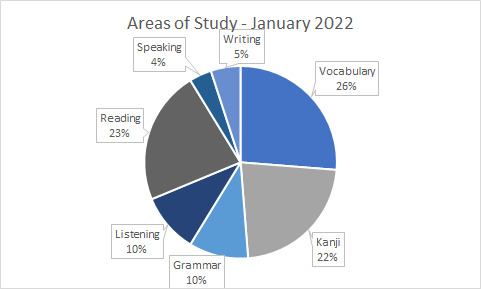
Going Forward in February
I would like to build upon the momentum I created this month, and while I'd like to continue with the routine I have right now, I would like to add in a few other things to try to mix things up and keep studying interesting.
Continue with the six primary goals I made at the beginning of 2023
Try focusing on a different skill category each month
(January has been focused primarily on Reading - I'd like to focus on Listening in February)
Try out a new app - I've downloaded a few different apps that I would like to try out in some detail
Refocus my kanji study on 常用漢字
I hope your language learning journey in 2023 is everything you want it to be! Best of luck everyone ^.^
皆さん、2023年の勉強を努力しましょうね!とても生産的な一年になりますように ^.^
#日本語#japanese#japanese language#japanese langblr#japanese studyblr#langblr#studyblr#日本語の日記#japanese diary#japanese goals 2023#japanese studyspo#tokidokitokyo#tdtphoto#my photo#japanese goals january 2023
21 notes
·
View notes
Photo
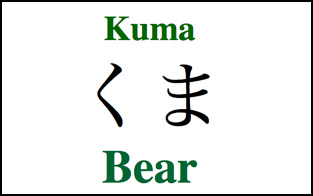
Do you know how to say bears in Japanese? Bears in Japanese is 熊 (くま) ʕ•̀ω•́ʔ✧
http://www.punipunijapan.com/vocab-lesson-1-forest/
#Japanese#japan#nihongo#learn japanese#japanese lesson#online japanese lesson#kakehashi japan#kakehashijapan#kakehashi llc#kuma#japanese tutor#japanese tutor online#japanese teacher#online japanese teacher#bear#bears#mori#forrest#beginner#sensei
17 notes
·
View notes
Text
JLPT N2 Resources
Hello! I am a 4th year university student studying Japanese and Spanish, and I wanted to introduce some of the resources that I've been using to study for the JLPT N2 that I was planning to take in December (until it got cancelled...) I've been studying Japanese for 3 years, and I passed the JLPT N3 in July 2019. I was supposed to go to Japan to study abroad in March this year, but it was cancelled due to Corona, so I've been self-studying N2 material so that I can keep up with my classes when I go back to university. I'm also sorry this post is so long without a read more section, because my Tumblr currently is not working properly and I'm posting on mobile.
The JLPT is made up of 5 sections that are split up over 3 tests: the first is normally Vocabulary (including Kanji) and Reading, followed by Grammar, and then finally a Listening section.
Vocabulary & Kanji:
For studying vocabulary and kanji, I would recommend the 総まとめ (Sou Matome) series of books. They give you clear lists of the vocabulary and kanji that you need grouped by theme, split into manageable chapters that are designed so that you can do a few pages a day for 8 weeks. At the end of each day there is a small test, and then on day 7 there is a more comprehensive test of all the vocab/kanji in that chapter that help test your memory.
In terms of actually remembering this vocab/kanji, I would suggest using the memory card app Anki. I used to always hear people recommending Anki and I didn't understand why, because I didn't get how the software worked, and I didn't want to be confined to just learning 20 words a day, but now that I've been using it for around 6 months now, I understand how beneficial it is. You first learn your 20 new words, and then the next day you review them, and then you continue reviewing cards and build up your memory, and the number of reviews you do per day increases (mine is normally around 100) but it only really takes around 10-15 minutes to do, so I would definitely recommend.
In order to practice the vocab and kanji that you have learned, I would suggest the ドリル&ドリル文字語彙 (Drill & Drill Moji Goi) book, which is literally just a textbook of example questions that will appear on the actual exam, and I found very useful for consolidating my knowledge and finding other vocab that wasn't in Sou Matome.
Reading:
For reading, I definitely recommend the 新完全マスター読解 (Shin Kanzen Master Dokkai) book. Personally I don't like the way the Sou Matome book is set up in regards to the reading portion, so I prefer how Shin Kanzen Master just gives you lots of practice questions, with little explanations of tips to help you answer at the beginning of each chapter.
I'd also recommend reading whatever you can get your hands on. Bookwalker is a great website for getting Japanese novels online, as I read the book for Kiki's Delivery Service on it and am currently reading the Your Name novel there too. At first it's really difficult to read, and you find yourself looking up lots of words, but I PROMISE it gets easier! On the first few pages of Your Name I was looking up like 30 words a page, but now I can go through at least 3 or 4 before having to look one up. Reading the news is also a good way to practice, such as TBS News, which has short articles that are fairly accessible.
Grammar:
I originally used the 新完全マスター文法 (Shin Kanzen Master Bunpou) book, and copied each of the grammar points along with some example sentences into a notebook, however while I appreciate the thoroughness of the book and the practice questions, I sometimes found that I didn't understand some of the explanations as to how certain grammar points were different, or their uses, and so while I think the book is a good base, I would actually recommend you use free YouTube and website resources.
My first recommendation is the channel 日本語の森 (Nihongo no Mori), who have a whole playlist of videos dedicated to N2 Grammar. From the list that the teacher in the video goes through, I would often then find the grammar point on 日本語NET and look through the explanation and example sentences they have to get a better idea of the grammar's usage.
But again just knowing the grammar point isn't the same as being able to answer questions on them, so I went through the Drill & Drill Grammar book which has hundreds of practice questions so that you can get familiar with how to answer everything and the different situations where different grammar points need to be used.
Listening:
Unfortunately I don't really have any advice for listening, as I haven't done any formal listening practice. I am a big fan of anime, and I've recently switched from watching anime with subs to without, so I can focus on trying to understand what is being said myself. Obviously anime is not necessarily an accurate representation of everyday Japanese or of what will be on the exam, and so if I knew I was actually taking the test, I'd definitely probably use either Sou Matome or Shin Kanzen Master books to practice. Also, during quarantine the voice actor Hanae Natsuki posted videos every day of him and friends playing video games, which I always watch, and I can understand most of what is said, so that counts as extra listening!
And that's all I have to say for now, sorry this was so long. If anyone has any questions on anything to do with the exam or resources, or has any suggestions of resources they've used, feel free to add them or message me!
#jlpt#japanese#studyblr#langblr#resources#japanese resources#language resources#languages#language learning#jlptn2#jlpt n2#long post
2 notes
·
View notes
Note
hey i know this is kinda offtopic but, do you have any advice for someone who wants to seriously learn japanese without access to a class??? ive wanted to play the diabolik games for a while but ive wanted to visit japan even longer
Learning from authentic material such as games, TV shows, etc. is great but you do need a solid basic knowledge first.
Personally, I would recommend the youtube channel 日本語の森 or ‘nihongo no mori’. They focus on the JLPT exams, but their videos all feature native speakers explaining grammar/vocabulary to you with conversations and example sentences. The lowest level is N5, so that’s a great way to start.
At my university, we used the Genki series which are also great for vocabulary, grammar and reading, but the exercises are geared towards a classroom setting where you have a teacher to correct you. (There’s no answer key in the book itself)
Last but not least, Diabolik Lovers is unfortunately not the way to go for a beginning learner. The games contain a lot of high level kanji (I’ve seen even Japanese struggle reading them out loud while playing/streaming the game) and each character has its own speech pattern which can be very confusing when you’re not familiar with the language yet.
To start, you should really aim for games and anime that are geared towards children.
20 notes
·
View notes